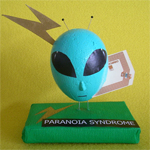Paranoia Syndrome
Pervasive Mobile Multi-Player Game
 | Supervisor: Participants: Subjects: |
Paranoia Syndrome is a pervasive, mobile multi-player game developed within the ISNM Game Design Course in 2005. Paranoia Syndrome is a science-fiction strategy game about the battle between humans and an invisible alien race. The playing field is a part of the real world and players move physically to reach certain locations and to achieve their goals. In order to win, players have to act cooperatively as a team, with communication also taking place by real world means, e.g., real voice, telephones or other telecommunication infrastructure. Interaction with the simulated game-world – which can be thought of as being superimposed upon reality – is performed through two types of interfaces.






The Virtual Interface is realized as a graphical user interface on the PDA of each player. It contains functions for querying information about the game situation and means for invoking actions. The PDA interface thus acts as a kind of location-aware “magic lens” and is the only channel to perceive the otherwise invisible aliens present in a specific location. The Tangible Interface is realized by integrating specially prepared real-world objects. These objects can be bought, used and sold (for game money) by all participants during game play. Equipped with RFID labels, these Tangible Objects can be identified and operated by the user using the RFID scanner on the PDA.
More information can be found at:
- Project Page
- Guido Heumer, Darren V. Carlson, Sreeharsha Kaligiri, Supriya Maheshwari, Hasan Waqar-Ul, Bernhard Jung and Andreas Schrader
Paranoia Syndrome – A Location Based Pervasive Multiplayer Game using PDAs, RFID, and Tangible Objects
Third International Workshop on Pervasive Gaming Applications - PerGames 2006, Dublin, Ireland, May 7, 2006. - Guido Heumer, Darren Carlson, Bernhard Jung and Andreas Schrader
Paranoia Syndrome – A Pervasive Multiplayer Game
In: C. Röcker and C. Magerkurth (eds.): Pervasive Gaming Applications, A Reader for Pervasive Gaming Research, vol. 2. Shaker Verlag, Aachen, Germany, November 2007.
